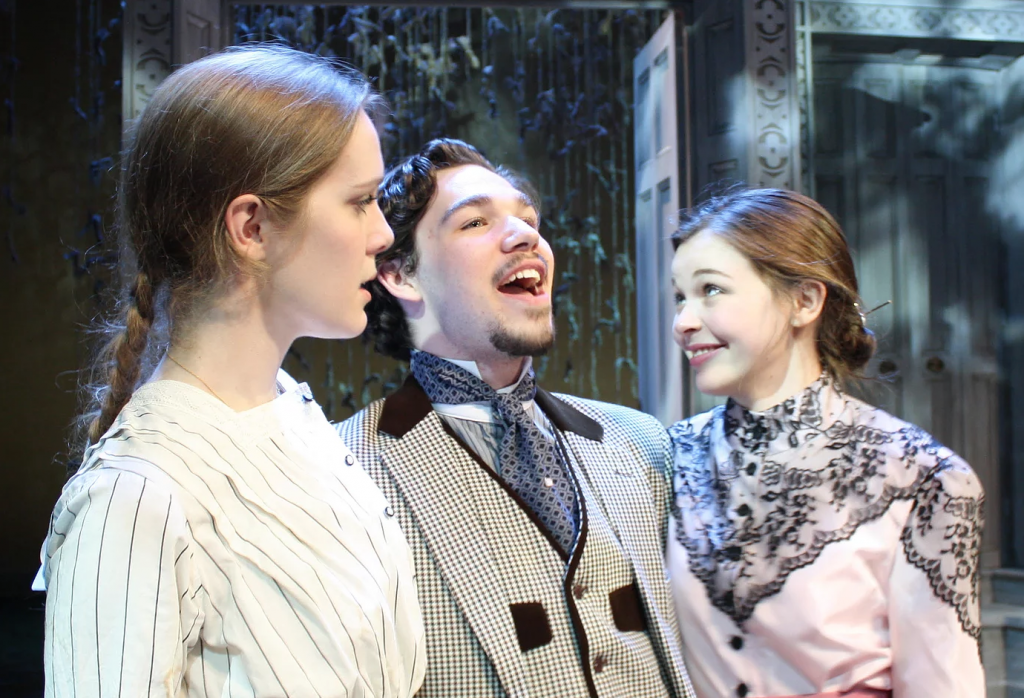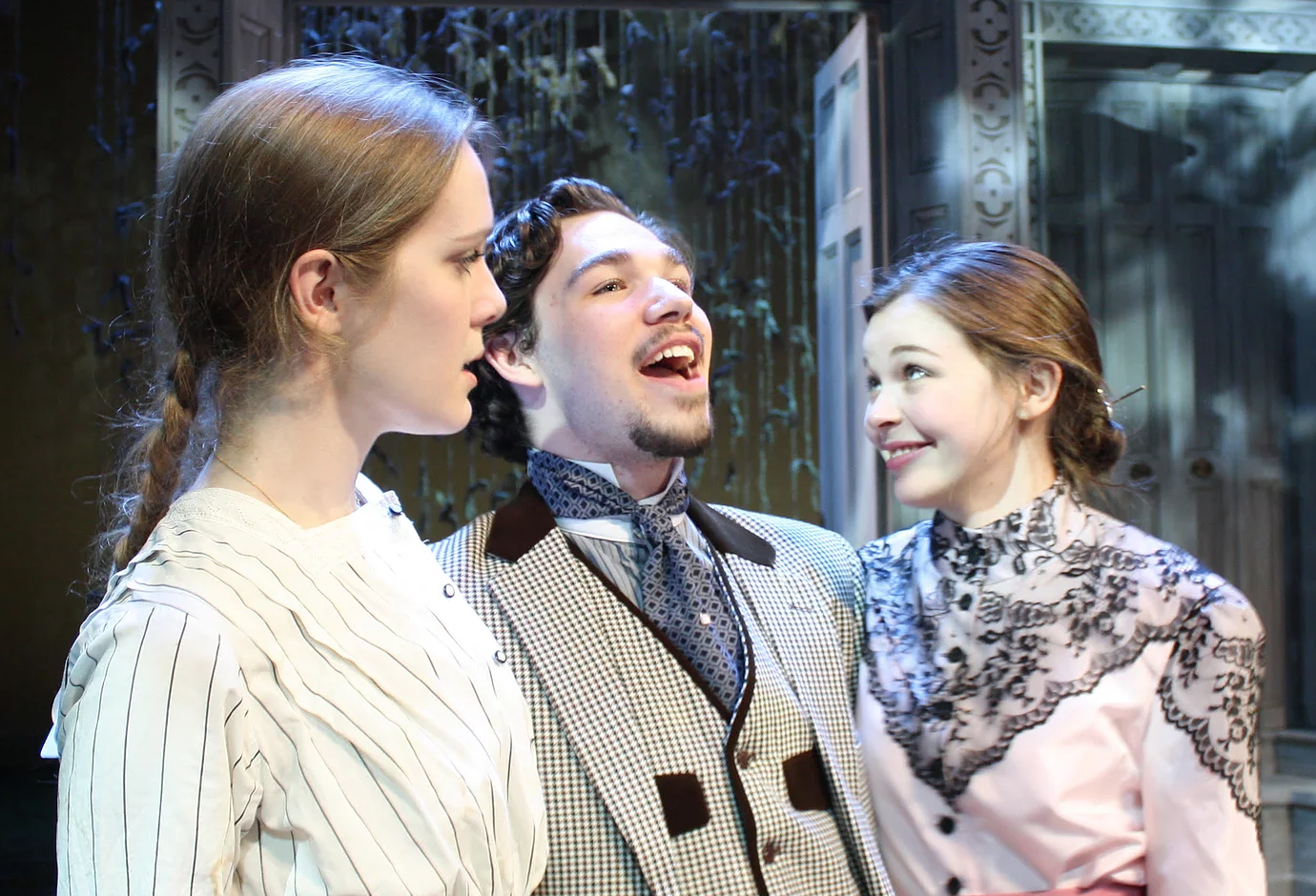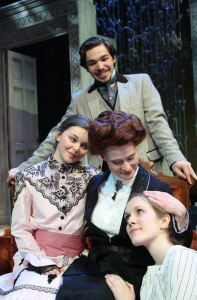 It’s about a family. No, really – there’s not a single singing pirate, thought experiment, or lip-sync showdown in this show. There are people, though; people who, when the spotlight is turned on them, have no choice but to stand up on the stage and proclaim their truth. This family is just a family – a family with problems and multiplicities and intersections not unlike any other.
It’s about a family. No, really – there’s not a single singing pirate, thought experiment, or lip-sync showdown in this show. There are people, though; people who, when the spotlight is turned on them, have no choice but to stand up on the stage and proclaim their truth. This family is just a family – a family with problems and multiplicities and intersections not unlike any other.
For Anton Chekov’s The Cherry Orchard, though, this doesn’t mean that the family isn’t worth exploring. Rather, the very fact that it’s unlike any other is what makes it worth examining – any family can be the subject of a play, and any family’s struggles can be translated into stage-worthy conflicts. All we have to do is take a closer look.
Directed by theatre professor Matt Moore, The Cherry Orchard has already begun performances and will run until Apr. 29. As the last mainstage performance of the year, this show is set to bring together stunning sets, gorgeous costumes, beautiful music, and extraordinary acting that transports its audience to turn-of-the-century Russia. Posie Lewis ’20, who plays the young and optimistic Anya, outlines the intense backstory that mars the initially idyllic atmosphere created by these different aspects of the play.
“The Cherry Orchard is about a family that’s kind of been broken up by a death in the family five years before the show begins, and so my character’s mother… has been away abroad for five years,” Lewis said. “So our family has kind of been separated, and now everyone is back on the estate because everything is in financial trouble and [they’re] potentially about to lose the estate. And so it’s about…what really matters to them in the face of the changing Russian… class system, and…their relationships with one another are so distracting that they can’t really figure out what the best course of action is.”
Though the play was originally penned in Russian in the early 1900s, its powerful narrative still manages to capture the trials and tribulations of today’s households – according to Erin Bradford ’17, who brings to life the hopelessly romantic servant Dunyasha, this may have something to do with the translation chosen by Moore.
“It’s a classic story, and I think Stephen Karam’s new version of it helps make it more relevant today,” said Bradford. “You can see people in your life in each of the different characters through [the] generations, and it’s still very true to those generational gaps, I think. So that’s kind of interesting, even though it was written…many years ago.”
Lewis, on the other hand, believes that the play’s message really sets it apart from others like it in terms of longevity.
“I think the show is still important because it has themes that kind of transcend a hundred years,” Lewis said. “I think we’re still working towards a better future and I think…people still have such different ideas of what a better future looks like, and we still struggle with our past sort of clouding what we want our future to look like…I think that’s a huge theme in this play…sort of letting go of where you come from or who you think you are in order to be who you really want to be, or contribute to a world that you want to see.”
This philosophical interpretation of The Cherry Orchard’s core is shared by actor and musician Matt Gill ’18.
“…For me, The Cherry Orchard is about everything that goes on in our guts that scrapes against what’s going on on the surface, and the tension between that is in every single moment that we’ve carved out in this show,” said Gill. “It’s in the music, it’s in the set, it’s in the lights, it’s in the acting, it’s in the directing, so that’s what it’s about for me.”
Gill (along with his illustrious beard) appears on stage as a homeless man, but, behind the scenes, he’s the mastermind behind the show’s instrumental moments. Originally asked by Moore to write a melody for lyrics embedded in the script, Gill ended up not only crafting one tune, but many – he is the composer of every piece in the show.
“[At first,] Matt [Moore] and I sat through and went through the script and picked a bunch of songs, and then Matt was like, ‘These are all really large orchestras. That would not be in this estate,’” Gill said. “They keep talking about…this little, dinky, home-strung band that plays at their parties when they have them…so they wouldn’t be a thirty-piece orchestra. That just doesn’t make sense, so [Matt Moore] was like, ‘Can you just write the music?’…and then I got this cute little band together with some talented musicians… the music’s goal is for [one] moment to kind of affect the audience as it does the characters. Because they’re obviously going to be affected by it no matter what, but if the audience is in this dream state, this dream ballet, this ethereal thing that’s going on, then they’re going to be hit by it too. Hopefully.”
Brooke is a senior double majoring in English and Media & Communication. She's passionate about french toast, Kate Bishop, Steven Universe and the ocean coasts of Ireland. On campus, she is a Writing Tutor, Orientation Leader and member of the Girls Next Door, Muhlenberg's all-lady a capella group. She could not be more excited to serve as your Editor-In-Chief this year!























